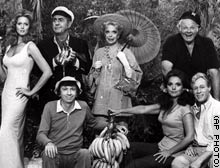More reasons to feel sick today:
Man Arrested for Blowing Shofar at Western Wall
Monday, September 25, 2006 / 3 Tishrei 5767
Shades of the 1920's: A Jewish man was hauled off to the Old City police station in the middle of prayer for sounding the shofar during Rosh HaShanah services at the area known as the Kotel HaKatan.
The incident occurred around 7:30 in the morning, at the northern-most section of the accessible Western Wall - a little-known area called the Kotel HaKatan, the Small Wall. It is considered to have extra sanctity, as it stands opposite the presumed spot of the Holy of Holies of the Beit HaMikdash.
Yesterday morning (Sunday), a group of some 10 men and two women gathered at the site, as they have done for several years on Rosh HaShanah, for early-morning prayers. The holiday prayers feature the blowing of the shofar (ram's horn) at several different times. Towards the end of the first shofar sounding, a Border Guard policeman came in, made an unclear motion with his hand as if to ask what was going on, and then left. He said nothing.
Shortly afterwards, Eliyahu K., the 20-year-old prayer leader, blew the shofar a second time, in the midst of his silent prayer (in accordance with Sephardic custom). Policemen came in once again and began trying to pull him away. However, Eliyahu was in the midst of reciting the Amidah - a long passage during which one must stand in one place without moving - and he therefore did not move.
The policemen informed their supervisors by radio that he was praying and refused to move, and reinforcements were soon sent - no fewer than 20 policemen, according to several witnesses.
They then started dragging him out, and when they stopped for a moment, he got up and resumed his prayers. They then began to drag him away again, and shortly afterwards again stopped for a moment - and again he resumed his prayers. At this point, the policemen allowed him to complete his prayers.
In the meanwhile, the other members of the prayer group came out and tried to prevent the policemen from taking Eliyahu away. At this point, the policemen started swinging their clubs violently; no one was hospitalized, but "it was a big brawl," in the words of one witness, with many people being dragged around and beaten while wearing their prayer-shawls and Sabbath suits.
Meanwhile, Eliyahu was taken to the small police station at the Western Wall plaza, and several of his friends followed him there. They wanted to go up the steps into the police station, and demanded that at least the shofar be returned, but the police again came down with their clubs.
They finally took Eliyahu by foot, accompanied by his fiancée, all the way around the Old City, past Mt. Zion and through Jaffa Gate, to the Kishle police station inside Jaffa Gate. At this point, there was no longer any violence, and Eliyahu was released around 11:30 - after being charged with attacking a policeman, disturbing a policeman in the line of duty, and disturbing the public order.
One witness related, "It's not only that they stopped him from blowing the shofar, but rather the fact that the police beat us up very harshly. I was on my way to the Wall for prayers when I saw 5-7 policemen going with Eliyahu and protecting him very closely. I walked after them, and then a few of his friends came, and then the violence started. We asked the policemen to return the shofar, and they started kicking us and punching us."
The worshipers said that the police had apparently been called by an Arab woman who said the sound of the ram's horn disturbed her children.
A Jewish resident of the Old City told Arutz-7, "How ironic. The loud Arab weddings and nightly prayers by the muazzin [over a powerful loudspeaker] at 4:30 AM disturb our sleep every night." Similar complaints are heard from Jews living near Arab villages in Judea and Samaria.
A member of the Jerusalem Police spokesman's office, contacted by Arutz-7 for a statement on the matter and asked whether this signified a new policy towards shofar-blowing at the Wall, said, "When we have an answer for you, I will get back to you."
The head of the local council of the Jewish Quarter of the Old City, Shmuel Yitzchaki, could not be reached for comment by the time of this report.
The rabbi of the Western Wall, Rabbi Shmuel Rabinovitch, told Arutz-7, "This is a very grave incident, and I have asked the local police commander, Yossi Priente, to check into it - both the violence and the prevention of the shofar blowing. It reminds us of the days of the British Mandate when Jews [had to make] super-human efforts to blow the shofar at the Western Wall."
He was referring to the 1ate 1920's, when the British, in an attempt to appease the Arabs, and following violence at the Wall, forbade shofar-blowing at the Wall. In one famous incident in 1929, a man named Moshe Segal blew the shofar at the conclusion of Yom Kippur - and was immediately arrested by the British. Though he had fasted for the previous 25 hours, the British detained him without food until midnight, when he was released. It was later reported that the release came about when then-Chief Rabbi Avraham Yitzchak Kook informed the commander that he himself would not eat until Segal was released.
Nearly 40 years later, following the first Yom Kippur service at the Wall under Israeli sovereignty, shortly after the Six Day War, the shofar was again sounded - by Moshe Segal.
I now see that both
Jameel and
JoeSettler also wrote about this, check out what they have to say.
J.
Quote from
Bounty Killer (1965)
------------------------------------------------
"They who would give up an essential liberty for temporary security,
deserve neither liberty or security"
– Benjamin Franklin






